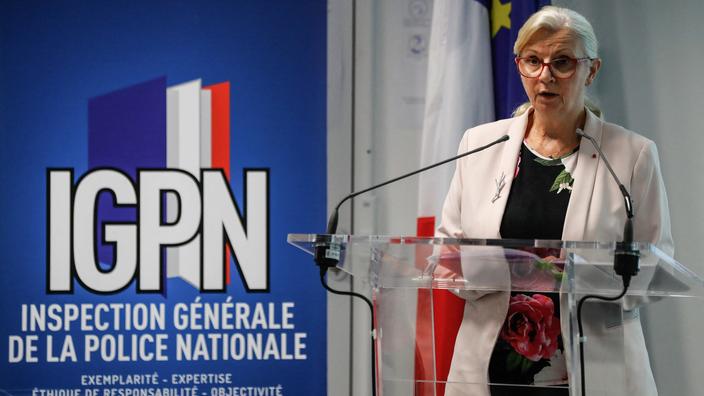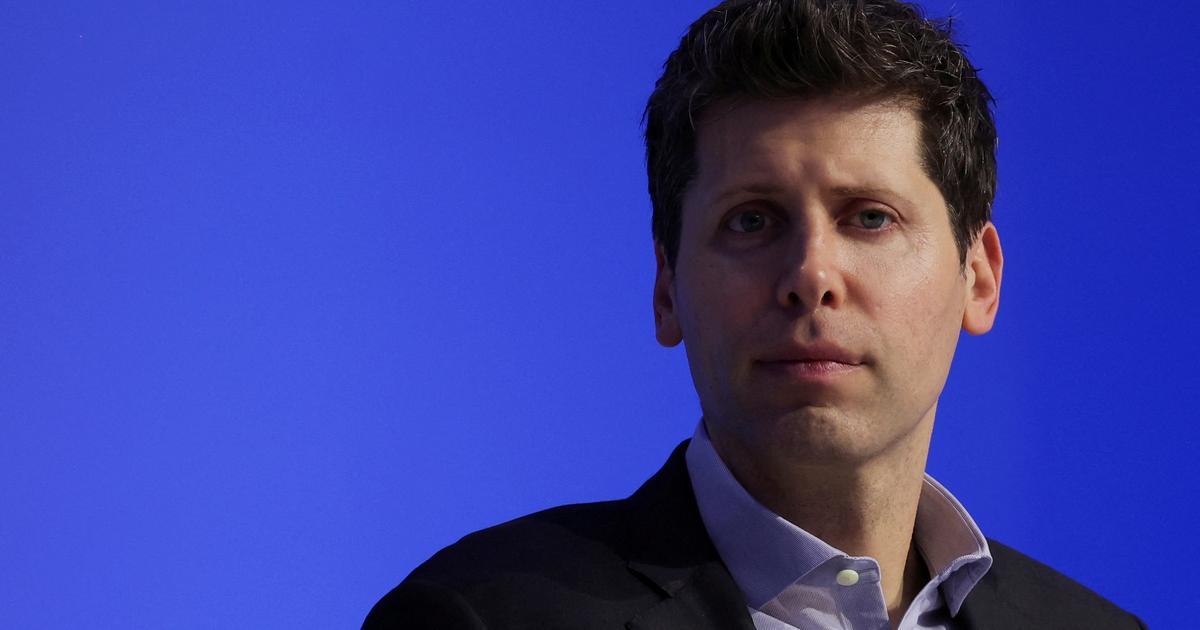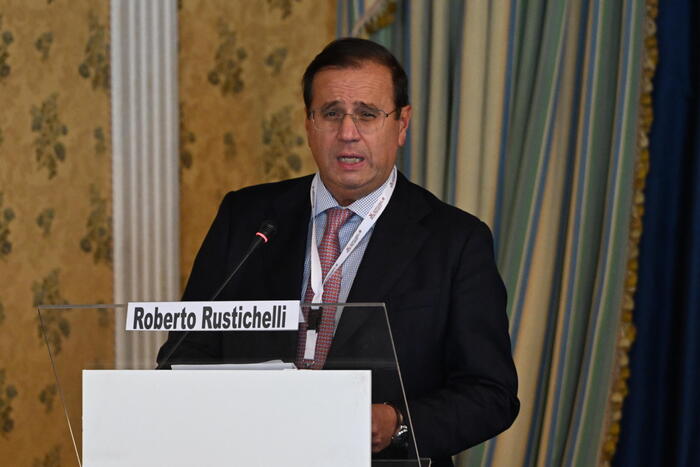To close the "Beauvau of security", Emmanuel Macron announced in Roubaix the establishment of "
a parliamentary control body of the police
", whose reports will now be "
made public
".
"
We must tend to blamelessness (...) When there are faults, they must be punished, when we love our police, we do not pass everything to them
", underlined the head of the State.
"
This is why I will propose to the presidents of the parliamentary chambers that, on the model of the parliamentary delegation to intelligence, be created a parliamentary control body of the police which will be able to assess their action
", he said. -he adds.
Read also Beauvau security: reform of the IGPN, presence on the ground, budget ... What to remember from Emmanuel Macron's announcements
If 75% of French people trust their police, the IGPN is often criticized.
Strong interpellation, social movements like that of the Yellow Vests, suspicion of collusion with the police, or even of laxity, mistrust of the institution persists.
But where does this distrust of the IGPN come from?
What are its missions?
Created in 1854, the IGPN is made up of 285 agents: a hundred investigators, auditors, lawyers, a magistrate and apprentices.
They control the action of the National Police and the Paris Police Prefecture.
“
The IGPN has two investigative methods.
Or administrative referrals, ordered by a police authority, which follows the traditional administrative investigation procedure.
The powers of the IGPN are limited because only civil servants are required to defray in this case
”, decrypts Jean-Michel Schlosser, sociologist and researcher at the Center for Studies and Research on Jobs and Professionalizations (Cérep) at the University of Reims.
Read also "
Make the IGPN an independent authority?"
It would be a resignation of the sovereign state
”
The IGPN can also carry out a judicial investigation if it is referred to by a public prosecutor or an examining magistrate, with the powers provided for by the Penal Code. In both cases, “
the inspection only makes proposals. As part of the administrative investigation, it transmits the file to the higher authority and for a judicial investigation it is justice that then follows its course,
”recalls Jean-Michel Schlosser.
Indeed, confusion often returns after social movements.
The IGPN would launder or even cover the acts of the police.
The “
police of the police
” is an investigation service which makes conclusions by suggesting sanctions to an authority competent to judge.
According to its annual report, the IGPN had 272 agents in 2020, 74.2% of whom were police officers, carried out 1,101 judicial investigations, against 1,460 in 2019, which is “
a record year
”.
SEE ALSO -
Beauvau de la sécurité: "
We have come to the end of this system
", deplores David Le Bars
What are the criticisms made against the IGPN?
The main one is that of independence. Indeed, the IGPN is made up of police officers investigating other police officers. Obvious for several researchers interviewed by
Le Figaro.
"
You have to know the institution from the inside, its ways of working and sometimes the methods of concealment,
" assures Mathieu Zagrodzki, sociologist and researcher associated with the Center for Sociological Research on Law and Penal Institutions (CESDIP).
“
In general, there is the question of the transparency of the police institution in France, which is traditionally closed. For several years, it has started to open up, but communication and educational work is necessary on its way of working,
”insists the researcher.
A lack of transparency which creates in public opinion a feeling of opacity, bordering on conspiracy.
“
The IGPN suffers from a lack of transparency, but also of legitimacy since it is attached directly to the general direction of the National Police.
Even if there are changes in communication, it gives the impression from the outside that things are hidden from us.
There is a feeling of opacity, as if the police, who are investigating the police, are keeping things in secret that would be questionable or
shameful, ”summarizes Mathieu Zagrodzki.
To read also Hostile to a suppression of the IGPN, Gérald Darmanin is ready for a "
grooming
"
Periods of social protest, such as the Yellow Vests or
Black Live Matter,
are peaks of criticism towards the institution. “
This is an opportunity to focus on the reproaches made to the IGPN. Reproaches that are often heard in another context, that of delinquency. Especially at the time of arrests which can give rise to violence that it is up to the justice to qualify as legitimate or not,
”notes Jean-Michel Schlosser.
Despite public criticism, the IGPN, nicknamed "
beef and carrot
" because their interrogation would consist of simmering the suspects, is "
very feared
" in the ranks of the police.
“
It's never pleasant for a police officer.
Where we see a violation of the law or deviance, the police will say that they do a difficult job and make complicated decisions in the heat of the
moment, ”recalls Mathieu Zagrodzki.
What are his investigations focusing on?
According to the IGPN annual report, 2019 is a year of "
exponential increase mainly linked to referrals following the demonstrations of yellow vests
", and 2020 "
marks a return to activity quantitatively comparable to that of 2017 or 2018
".
Last year, out of the 1,101 investigations carried out, 532 investigations relate to the use of force “
representing a little less than half of the portfolio of the IGPN investigative services (48.5% of judicial investigations).
This number is down significantly compared to 2019: - 39%
”.
This is the lowest number over the past five years.
Nature of the alleged criminal offenses.
IGPN / screenshot
This violence occurs in half of these cases (41.5%) during an arrest or a similar operation (search and arrest, police rescue operation, refusal to comply, etc.) and in the context of events and security services (21.5%).
To a lesser extent, two other situations are at the origin of the referrals: identity checks (13.5%) and road checks (11%).
Logically enough, it is on the public highway that this violence occurs most frequently (63%) then in police stations (12%) and in the context of custody measures (8%).
Read alsoReform of the IGPN: what do the “police forces” look like abroad?
The IGPN investigation services forwarded, in 2020, “
207 investigations to the administrative authority against 238 in 2019. Of these investigations, 38 did not reveal any breach, 169 investigations revealed breaches committed by 258 officers. , and 520 breaches were thus highlighted.
In 2020, the IGPN proposed the referral of 122 agents to the disciplinary board
, ”explains the report.
Who runs it?
Since 2019, it has been the police commissioner Brigitte Jullien.
The IGPN is attached to the General Directorate of the National Police, which reports to the Ministry of the Interior.
What will the future parliamentary control body for law enforcement look like?
The outlines have not yet been specified but last April, Emmanuel Macron had mentioned in an interview with
Figaro
the creation of a "
parliamentary delegation responsible for the control (of) police
", like the delegation for intelligence.
The latter, created in 2007, is made up of four senators and four deputies responsible for "
exercising parliamentary control over the action of the French Government in matters of intelligence and the evaluation of public policy in this area
".
“
Its work is covered by national defense secrecy.
Each year, it draws up a public report taking stock of its activities.
It can also address recommendations and observations to the President of the Republic and to the Prime Minister
”, specifies the presentation of the delegation.
SEE ALSO - Emmanuel Macron wants to double the number of police officers on public roads within 10 years.











/cloudfront-eu-central-1.images.arcpublishing.com/prisa/KMEYMJKESBAZBE4MRBAM4TGHIQ.jpg)



